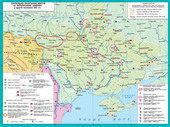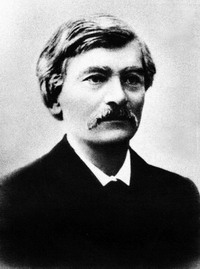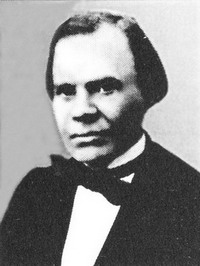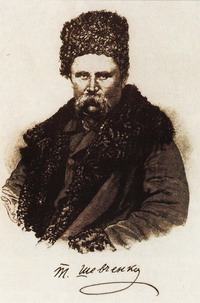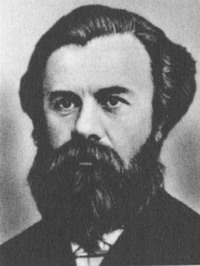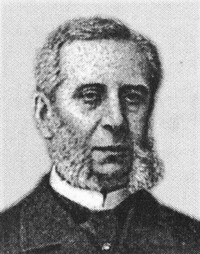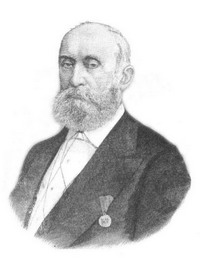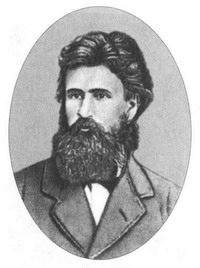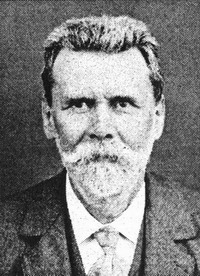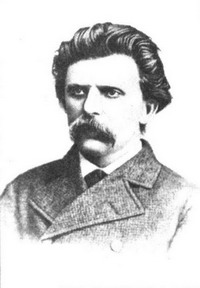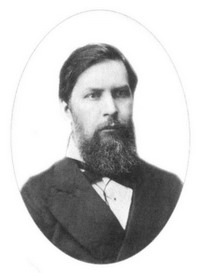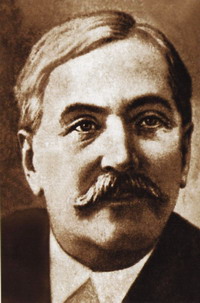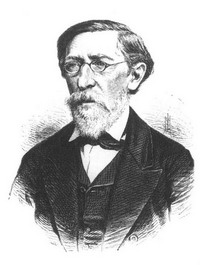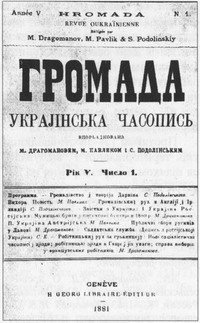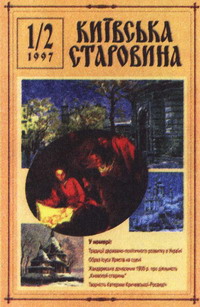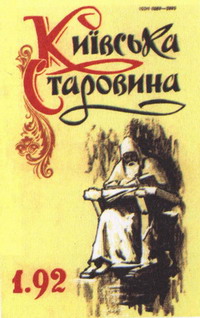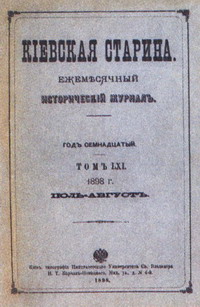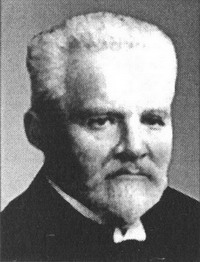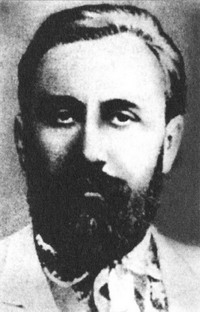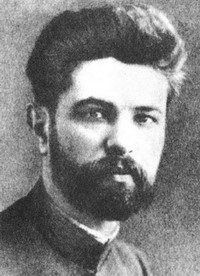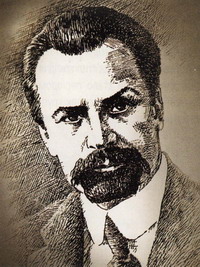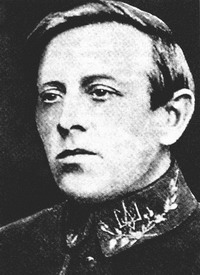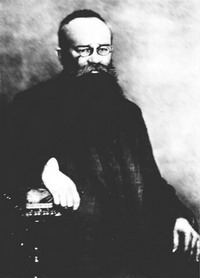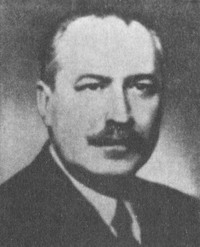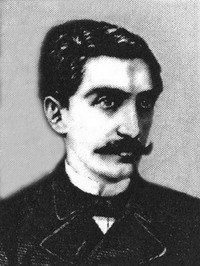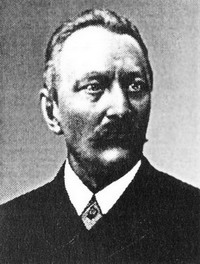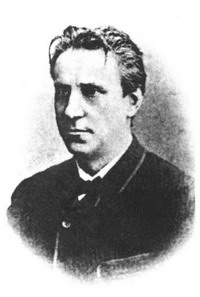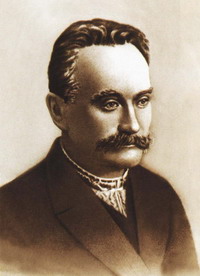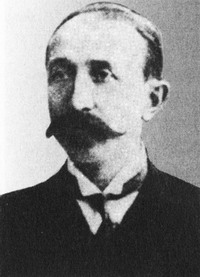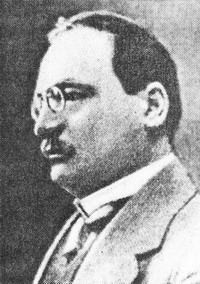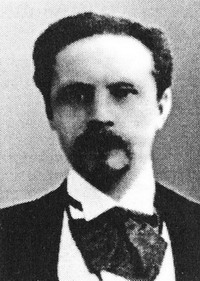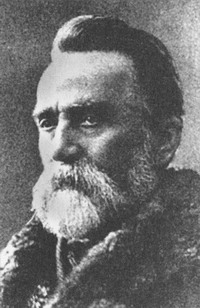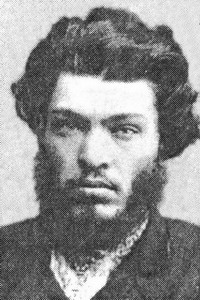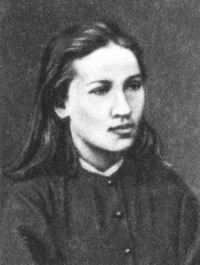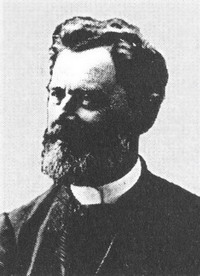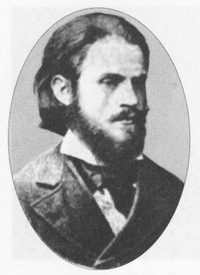Social and political life of Ukrainian lands in the second half of XIX - early XX century.
1. Communities' movement in the Dnieper Ukraine 60-90 years of XIX century.
End 50 years of the nineteenth century. in terms of liberalization of the tsarist regime is the revival of Ukrainian nationalism. One of the centers of the revival of the Russian Empire became the capital of St. Petersburg. It was just a lot of Ukrainian and here, after serving sentences, allowed to return and occupy high positions even former Bratchikov: Kostomarov Belozersky Shevchenko.
As much effort to serve his people, Ukrainian leaders Petersburg in 1859 created the first Ukrainian community - cultural and educational organization aimed at popularization of the national idea through publication of books, magazines, holding concerts, teaching in Sunday schools. Actually, the first community organization called difficult, rather it was an informal gathering leaders of the Ukrainian movement. However, it has become an example to follow.
In order to disseminate their views of St. Petersburg community Belozersky began the initiative to publish the magazine "basis" (1861-1862). In 60 years it was the only Ukrainian periodical that covered all the nationwide problem - in culture, economics, politics, education, science, literature, folklore, history, mizhnaodnyh relations. History clearly shows that the existence of the Ukrainian nation and culture were indisputable fact.
Ukrainian national movement vidrozhduvavsya, captured not only Ukrainian, but even some of the young Polish noble family or spolschenyh right bank Ukraine. Tortured conscience of these people realize that their grandparents, great-grandfather was oppressed for centuries the Ukrainian peasantry, and therefore they should be closer and prysluzhyty people. This group is led by Vladimir Antonovich called hlopomanamy (derived from the word "serf" - Polish title abusive landlords to Ukrainian peasants), even though they themselves have called themselves ukrainfil. They went to the Catholic faith in the Orthodox hardly Ukrainian national clothes, sang Ukrainian songs, deliberately kept the folk customs and avoided the peasant community. At its inception hlopomany during student holidays and other free time traveling through villages to collect folk tales, listen, I `, customs and ceremonies. Later they organized meetings, prepared and read out papers, issued a handwritten journalFinal and in 1859 founded an underground school, where they gathered the poor men who "taught in the national direction." In 1860-1861 he was outside circle hlopomaniv samorozpustyvsya and its members together with teachers and students of Kyiv uniersytetu, including P. Chubynsky, M. Drahomanov utvoyly new company "Ukrainian society", which in 1862 numbered 200 members.
Community in Kyiv, as well as communities that have emerged in different cities of Ukraine (Chernihiv, Vinnytsya, Ekaterinoslav, Odessa, Poltava, Kharkov) and Kuban (Katerynodar) and Moscow, most believed his task of national organization mother tongue education (establishment of schools, writing and publishing for their textbooks, teacher training, etc.), scientific research in the field of ethnography, linguistics, history, preparation and publication of popular books and more. In short, culture is engaged diyalnistyudiyalnistyu.
Revival of the Ukrainian movement at first caused no concern of imperial power and the Russian public. However, preparation and blast Polish revolt 1863-1864 biennium, the fear that Ukrainian culture is under activity will require the revival of former rights, and even independence, led to the publication of the Minister of the Interior Valuev July 20, 1863 teyemnoho circular which went down in history as Valuev Circular. The document forbade public use of Ukrainian language in public institutions, schools, churches, publishing popular, rylihiynoyi literature than fiction. The problem of the Ukrainian language roz'yazuvalasya famous phrase: "There is no separate Little Russian language was not, and there can be no".
Not stand the persecution by the royal authorities, communities one by one samolikvidovuvalysya or who were officially banned.
However, figures given to the revival of Ukraine did not have left work. The main activity they focused on achieving success in the field of science or education field. However, the lack of organization did not give opportunities to develop the Ukrainian movement. Only in the late 60's, after the weakening of anti-politics' are back with the community, but on irregular basis. And illegal situation gave little space for cultural activities and thus leads the Ukrainian movement all the time trying to find legal forms for your work. This possibility opened the establishment in 1873 the South West Branch of the Russian Geographical Society (PZVRHT), which became the center through Gromadovtsi Ukrainian Studies. In addition to the community in Kyiv took his hand editing Russian newspaper "Kiev Telegraph".
Grand opening took office February 13, 1873
Department was elected President Gregory P. Galagan, a high dignitary of education with landowners and the popular Left Bank in Kiev, patron, a man who cheered on the education of national intelligence. Cases the Manager was unanimously elected Mr. Chubinskogo. Authority, the Department became "Notes south-western department of YRHO. An informal body of department was also the newspaper "Kiev Telegraph", published in 1874-1876 biennium Its editorial committee includes N. Drahomanov, M. Sieber, F. Wolf, P. Chubynsky, Lysenko, P. Zhytetsky. The newspaper became an ardent advocate and defender of a great and fruitful work for the study of spiritual and material heritage of the Ukrainian people, which launched the Kiev community leaders under the auspices PZVRHT. Newspaper missed no occasion to pitch in to reduce one or another anti reactionary Russian press statement.
To work in the department were involved in significant scientific potential. Only full members recruit until 76, among them - Mr. Antonovich, MI Drahomanov, VR and MV Lysenko Lysenko, O. Ushinskiy (brother of the famous teacher) and many others. In them selflessly worked for the Department of a large cohort of staff and provincial correspondents who sent by the records of people's everyday life, traditions, beliefs.
Also publishing department has held a variety of activities. One of the first was held in 1874 census odnodnevnoho Kyiv. As a result of the census, which was also the first in the city and, it appears that in it for more than half the officially considered (total number exceeded 220 thousand people.). There was also specifies the national composition of the city: Ukrainian constituted the largest ethnic group.
Another important action of the Office, which entered the international publicity, was held in August 1874 with the third Archaeological Congress, which indicated a high level of scientific archaeological research in the Ukrainian lands.
Not breaking any laws and circulars, using only the Russian language, scientists have created a humanities research center of Ukrainian studies and extensive research involving the movement of scientists and enthusiasts provincials, collectors of all sorts of materials and contributors to major journals. In Ukraine, an embryo formed National Academy of Sciences.
Increase the authority of this cultural movement Under the Department (1873-1876) it had made considerable scientific activity: seven volumes published "Working South-West EXPEDITION" (on 1200 pages each, not including attachments) , two volumes of "scraps South-West Division Y.R.H.O., also prepared material on the three, volumes of works Maximovich MO; established ethnographic museum, a library, archive.
But this time is for scientific work closely hromadamen eye tsarist police rozhlyadilo threat to the future of Ukrainian separatism (department). Most efforts in the construction of defamation by Ukrainian leaders put M. Yuzyfovych, Poltava landowner, former member of the Kiev community, one of the organizers PZVRHT but loyal servant of empire.
Result of denunciations and slanders of the Ukrainian movement was signing king May 18, 1876 Ems decree. He dramatically increased the repression of Ukrainian culture and imposed a new ban on the Ukrainian language. It is prohibited: import from abroad, Ukrainian-language books, printing and publishing in Russia Ukrainian original works, translations, EU `s theater plays, texts to music, except for historical monuments. Ordinance PZVRHT abolished, prohibited the community has established strict control over literary works into Ukrainian, who had published the Russian spelling. Prohibited activities theater company with purely Ukrainian repertoire. A separate paragraph of the decree dealt with personally and Drahomanov Chubinskogo who were forbidden to live in Ukraine.
Ems decree was a serious blow to the Ukrainian science, culture and the Ukrainian movement in general. His decree remained in force in 1905, however this time the communities' movement was not stopped. The communities that survived continued to exist underground, looking for new ways to restore legal activity. As in previous years, the strongest and most influential was the Kiev (old) community.
Within the Russian Empire to arrange legal work was not so Gromadovtsi agree on the organization of the Ukrainian national centers abroad, which had set up a free publication of the Ukrainian press censorship and to the Ukrainian movement in Europe. Perform this task congregation commissioned Mikhail load. Also on the fate of his role had to develop a political program of the Ukrainian movement, that is put before him a clear goal and outline ways to achieve it, since it became clear that without changing the social order in Russia was changing for the better for not Ukrainian.
Leaving abroad Drahomanov tied close ties with Ukrainian leaders Galicia, together with M. and S. Pavlyuk Podolynsky began to publish the magazine "Community" (1878 - 1879, 1882). The basis of the proposed program Drahomanov lay these principles. as democracy (citizens of democratic rights and freedoms and organization of power to democratic principles), federalism (of Ukrainian stock in Russia's autonomous rights and implementation of public authorities); kulturnytstvo (liberation struggle must be conducted purely educational forms and methods), evolution (to avoid radical changes and favored gradual development); Europeism (oriyentaiya Ukraine in its development of Europe).
Unveiled Drahomanov program of those conditions that have ruled in Russia after the assassination of Tsar Alexander II, was too radical. Therefore Kyyivka severed relations with the community Drahomanov and stopped funding the magazine. She refused to political activities that could provoke reprisals from the Russian government. The only evidence of the Ukrainian movement in the Russian empire was the Russian edition of "Kievan antiquity" (1882 - 1907's) that went on Research of.
Such painstaking research work had attracted young people who wanted action and vigorous political activity that would be aimed at overthrowing the existing order and establish a new more equitable. Young hurtuvalas around the Russian and Polish movement that fought against autocracy revolutionary methods, but this does not satisfy its national aspirations and did not work the Ukrainian people. Finally, conscious young people has become orhanizovuvty community, called "young" or "student". A lot of them arose in the 90 years of the nineteenth century. Most radical of the student groups were tarasivtsi Fellowship (1891 - 1898 рр.).
Older generation hromadamen also concluded that without the daily political activity all of their previous cultural work will disappear. Makes it legally within the Russian empire was almost impossible, soothes Ukrainian leaders decided to lay the foundation for Ukrainian political movement in Galicia, where the conditions for political activities were more favorable. At the same time in Dnieper Ukraine, they decided to unite their forces to more productive activities in a cultural field. In 1898 in Kiev was established All-no party affiliation Organization (tools) who sang the role of coordinator of the community. Thus the community has grown from some groups to zahalnokrayinskoyi organization begun preparing the ground for political struggle. They ensured the connection of the Ukrainian movement - the Left Bank and Right Bank. Supplied nastupist generations of the Ukrainian movement. Gromadovtsi his prolific research on the history, ethnography, folklore studies, ajoints, linguistics proved that Ukrainians should hlybke historic roots, distinct ethnic identity, defined ethnic boundaries. They summed up the Ukrainian movement to realize the need to formulate and develop political action program.
Late nineteenth century. the Ukrainian movement of young intellectuals in the nationalist trend occurs. It originated as a reaction to the crisis of national culture movement (Ukrainophyls). Clearly, the root causes was the colonial status of the Ukrainian people in the Russian Empire.
The early 90's nineteenth century. Kyiv formed student group, which included MI Mikhnovskyy, SM rustle, AP Kuczynski and others. This circle had close relations with leading figures of the Ukrainian movement. From this group came out workers who will soon set up a secret "Brotherhood tarasivtsi. Even in 1891 the census of movable property in Poltava province known Ukrainophile OO Rusov, this work attracted many students. It was during this work formed a circle with four students (I. Lipa, M. Bayzdrenko, M. Bazkevych, V. Borovik). In the summer of 1891 they amounted to swear loyalty to the idea of liberation of Ukraine on the grave of Taras Shevchenko, founded a secret society whose members later started calling themselves "The Brotherhood tarasivtsi".
First public performance of "Brotherhood" was a speech read on Shevchenko's anniversary in March 1893 in Kharkiv University. That same year speech was published in Galician journal Pravda titled "Profession de foi young Ukrainian. The ideas expressed in speech, can hardly be described as nationalist (an independence), but against apolitical kulturnytstva and the general decline of Ukrainian social and political movement, they looked truly national radicalism. In the speech, asserted:
- a separate Ukrainian nation;
- as each nation, Ukrainian national will need to "work and progress";
- full autonomy of the Ukraine (then this slogan is no vidvazhuvavsya);
- unity of the Ukrainian people (this slogan has become the embryo of the future concept of collegiality of the Ukrainian state);
- negative attitudes Ukrainophyls (kulturnytstva), but recognized its benefits for the national movement;
- radicalism and extremism of "renegades";
- need to Ukrainian schools;
- use of Ukrainian and others.
Ideas "Brotherhood" found its supporters, but have not found wide acceptance because of their sharply negative attitude to the other movements of the Ukrainian movement and in the power of personal qualities leader tarasivtsi "MI Mihnovskiy.
"tarasivtsi Brotherhood was founded on the principles and rozbyvalos secret organization of" Five ", which at mid-90's operating in Kharkiv, Yekaterynoslav, Poltava, Chernihiv and some other cities.
congregant conducted mainly organizational and educational work, aimed at shaping national identity.
in 1893 in Kiev the organizational gathering, which probably had to give the organization more slender form. But since "The Fellowship tarasivtsi" had no concrete program of action, and sometimes simply duplicate old kulturnytstvo unique in extreme forms (eg, demonstrative wearing traditional dress), it was declining. Late 90's it actually collapsed. This was due to persecution and police members.
2. The emergence of Ukrainian political parties in the bank Ukraine in the late nineteenth - early twentieth century.
end of XIX - XX centuries. characterized the emerging social and political life of Ukrainian lands. The beginning of the revival of the nation "to refer to this time the famous Ukrainian writer and social activist VK Vynnychenko.
Ukrainian national movement becomes a political nature. In Ukraine they are formed first national political parties.
first national party in the Dnieper Ukraine (ie central, southern and eastern states of Ukraine) was the Ukrainian Revolutionary Party (MSA), founded January 29, 1900 in Kharkov figures student communities D. Antonovich, M. Rusov, G. Andrievsky, L. Matsievych et al. MSA political program in 1900-1903 he was the pamphlet M. Mihnovskiy "Independent Ukraine". M. Mihnovskiy, one time member of the Brotherhood tarasivtsi "active participant in the Ukrainian liberation movement, a lawyer by profession, was one of the ideological inspirer of MSA at the beginning of its existence. This outstanding political figures of Ukraine first raised Naddnepryanschine slogan of national independence. The main purpose of creation, he believed any price independent of Ukraine from the Carpathians to the Caucasus. " The basis of the Ukrainian nation MSA considered peasants. Since 1903 rupivtsi moved to Western principles of Erfurt Programme of the Social Democrats, called for national cultural autonomy within Russia.
1902 rupees away from the most radical wing of his party and formed - Ukrainian People's Party (NUP) led by M. Mihnovskiy. Party was overtly nationalistic. The main policy document "10 Commandments" proclaimed the creation of an independent democratic republic slogan "Ukraine for Ukrainian. 1903 MSA came from another group, headed by Mr Yaroshevskim. It naymenuvalo by the Ukrainian Socialist Party (USP). How NUP and USP were few and not having any mass support in the community, soon collapsed.
late 1904 - early 1905 after the new split in the PA formed a new political organization - Ukrainian Social-Democratic Union (abbreviated to "Union") led by student-Melenevskym M. Basco and A. cursive-Yoltuhovskym. Association was very numerous at that time (about 6 thousand members). She urged proletarians towns and villages to deploy strike movement. Armed rebellion as a form of revolutionary struggle, it is not welcomed. The land issue proposed to solve by democratic means: acts specially convened for the nationwide constitutional council. In 1905 the union merged with Menshevik faction RSDLP the rights of its standalone section.
the early twentieth century. appeared Ukrainian liberal party. Thus, in 1904 formed Ukrainian Democratic Party (UDP) led by moderate public figures O. Lototsky, were revised and others. Then it seceded from the Ukrainian Radical Party (URP) together with writers and Hrinchenko Efremova. Both parties - nechyselni in composition. In its main provisions of the program were close to Russia's Union of Liberation "(the future embryo Cadet Party), defended the Russian Empire, establishing a constitutional monarchy that would provide Ukraine the right to autonomy (about radical social change does not matter). The next year PSA and UDP merged into democratically-Ukrainian Radical Party (UDRP).
1905 and was reorganized remnants of MSA, which then adopted the name - Ukrainian Social-Democratic Labour Party (USDRP). Its leaders - D. Antonovich, V. Vynnychenko, Petliura, M. Porsh.
USDRP and union failed to produce clear tactics of its activities and cooperation with other parties and NGOs. 1909 Union disintegrated. Managers are USDRP, Petliura and W. Sadowski sought an ally in novoorhanizovanomu 1908 Ukrainian inter-political bloc of liberal activists (mostly of former members of the UDRP, which self-destruct) - Association of Ukrainian progressives (TUP). Leaders TUP - Hrushevsky, S. Wilkens, D. Doroshenko defended constitutional and parliamentary path of struggle for "the Ukrainian cause".
So NUP except that its declared ideal of the independent Ukrainian state, the other national parties Dnieper Ukraine (MSA, USP, Union, USDRP, UDP, PSA, etc.). have the basis of their political program requirements autonomy of Ukraine was part of Russia.
Among the all-parties that had their own committees in Dnieper Ukraine, it should be noted the Russian Social-Democratic Labour Party (RSDLP) that after the 1903 split of the Bolsheviks, led by V. Ulyanov (Lenin) and Menshevik leader whom was J. Tsederbaum (Martov), Party of Socialist Revolutionaries (SRs), the Constitutional Democrats (Cadets), "Union October 17 (" Soyuz on Oct.). There were also Polish Socialist Party and the Jewish "Bund" ("Union").
3. Populists, radicals Muscophiles in social and political life of the Western lands in the second half of XIX century.
suppression of the uprising in 1848 has strengthened the power of the Habsburgs. At that time Galicia and Bukovina belonged to the Austrian Empire, ruled Hungary Transcarpathia. These were some of the most backward parts of Europe. West-Ukrainian lands were actually internal colony. 1867 formed the Austro-Hungarian Empire. Strengthening the Hungarians, followed by Poles and their Ukrainian deeply impressed. Representatives of the Ukrainian movement, thinking over his future, looking for a strong pillar in the social and political life.
In their search of the western Ukrainian were not alone. The same problem was faced by other Slav peoples depressed - Czechs, Serbs, Bulgarians. All of them directed their attention to Russia. Yes, at Western strengthened Moscow's current supporters - Muscophiles or as they still called Russophiles. Flow especially strengthened in the late 60's of the XIX century. after spreading their influence to most of the clergy, which had enormous influence on public life. Russophilism has been by contrasting the Polish influence, means of self-Ukrainian spirituality.
Ukrainian Russophiles belonged to the part of representatives of the Ukrainian movement, which znevirylas the ability to achieve their own political or even cultural purposes. They saw the futility of attempts to raise the activity and people, willing to enlist the support of Russia, stressed the Russian and Ukrainian identity, proximity of their crops. However, ignorance of Russian, Ukrainian Language ignoring aggravate the scope of the Polish language. While prestige Russophiles published in obscure Church Slavonic language, they had considerable influence on the Ukrainian edition, they belonged to the largest newspaper "Word", a number of Ukrainian schools. In 1870 they founded a political organization - Ruska Council, which sought to convert the sole representative of all Ukrainian Galicia.
gradually vtyahuvalas Ukrainian youth in conflict with Russophiles, which belonged mostly wealthy religious and secular officials. First, the differences were in the field of language and literature. Russophiles promoted works by Russian writers Slavophiles. Youth from among students, priests, secular intellectuals fond of works of Taras Shevchenko, Panteleimon Kulish, Mykola Kostomarov. Those who are concerned life and destiny of the Ukrainian people, focusing on his problems called populists. The leading figures of the movement were Barvinsky V., V. Navrotsky, J. Romanchuk, O. Ogonovsky, A. Vahnyanyn.
For populists naypekuchishym was the question of language and literature. Their knowledge seen in the Ukrainian nation among others. Unlike Russophiles populists did not seek outside support. They organized secret clubs, published journals, developing Ukrainian grammar and dictionaries, established a theater, cultural and educational organization "Ruska conversation. In 1868 there were Prosvita "that engaged in study and education of the people.
miracle occurred in 1873 in Lviv. With the support of wealthy Lyzavety Skoropadsky-Miloradovich and Basil Symyrenka there was a literary society named. Shevchenko. Later it was called the scientific community and turned into an informal Ukrainian Academy of Sciences.
After a new wave of persecutions of Ukrainian culture in Dnieper Ukraine (Ems Decree 1876) populists were closely contacted with the eastern Ukrainian, who turned their attention to Western peers. Under their influence on Russophiles narodovtsi breaks. In contrast to their "word" they started publishing the newspaper "Delo".
In 70 years of XIX century. populists movement evolved radical movements. This was caused, in particular, energetic activity Drahomanov Michael, who encouraged young people to go on the older generation, not only words but deeds to raise the Ukrainian society. The most capable followers Drahomanov views were John Franco and Michael Pavlik. They launched the attack on Russophiles and later moved to the criticism and the populists. This led to serious differences in Western social movement, in practice, meaning the intellectual and ideological revolution.
political environment is dynamic. 1885 narodovtsi established representative body - the People's Council. In 90 years of the XIX century. populists emerged from four political parties.
4. The emergence of political parties in Western Ukraine in the late nineteenth century.
end of the nineteenth century. was crucial for the development of Ukrainian national movement. With the appearance of the first Ukrainian national idea of parties beyond the intelligentsia and media penetrates the masses. In the historical arena comes a new, energetic generation of leaders, which raises demand complete independence of Ukraine.
first Ukrainian political parties emerged in Galicia. In October 1890, in Lviv was founded the Ruthenian-Ukrainian Radical Party (RURP). Initiators of this party were Franko and M. Pavlik. For tips Drahomanov they have a position of "scientific socialism." In 1895 the program included provisions for the idea of socialism can be most fully realized within the independent Ukrainian state, but in the short term - within the fully autonomous province of the Austrian Empire. In addition to these provisions, the program put forward demands transfer of land to the peasants as much as possible. Deklaruvalos establishing collective organization of labor and collective ownership of means of production by Evolution. Party issued for rural newspaper Khliborob "and" Community ". To promote program provisions were issued a series of pamphlets under the title "Radical tactics" (Franko). Great attention paid party promoting their ideas in the peasant masses through various options ofyou organization. Despite the hard work, the party did not find broad support. Against it was set up clergy who blocked access to the Peasants Party. Socialist ideas were not supported by malochyselnist Ukrainian proletariat. In late 1899 party crisis.
in 1899 appears Ukrainian Social-Democratic Party (USDP), founded by Nicholas perpetual, Semen Wityk, Julian Bachinsky. It was created to defend the interests of Ukrainian workers. At issue were the national champion of political independence of Ukraine.
in 1899 formed the Ukrainian National Democratic Party (the UNDP), which became the most popular and most influential party. The founders of this party have been updated and some radical populists. Most outstanding figures of the party were E. Levitsky, V. Okhrymovych, Hrushevsky and Franko. In your program, the UNDP announced its long-term purpose of the national independence of Ukraine, its immediate goals is attributed autonomy and commitment to the preservation of the Habsburgs. In other respects it was typical of the Liberal Party, which sought to avoid acute social problems. His moderation and people 'tactics she won the favor of most of the population. Under her influence there was "Education" and other organizations and institutions.
Also in 1899 some members of the clergy formed the Ruthenian Catholic Union. But being a clerical-conservative party, she did not find broad support even among priests.
With the growing organizational and political force in Galicia Ukrainophiles waning influence Russophiles who handed over their positions as at the organizational and at the political level. Yes, "Enlightenment" in Galicia had 900 branches, similar Russophile organization - only 106. In the 1913 elections to the Galician Sejm was elected in 1930 and only 1 Ukrainophiles Russophiles.
Hoping delaying its decline, in 1900 Russophiles announced "new course" which called for full identification with Russia. They founded the Russian National Party, which has received large subsidies from the imperial government and was supported by the Polish aristocracy, so to split the Ukrainian movement.
5. Populist movement in Ukraine
narodniks - is an all different ranks of the intelligentsia movement, which arose under the influence of socialism and the peculiarities of Russia in the second half of the XIX century. They advocated the overthrow of the autocracy by the peasant revolution. Appearing in the late 60's of the XIX century., The populist movement became a significant factor in social and political life in the mid 70's. Narodniks were convinced that preserving collectivist traditions of rural communities in the future lead to a socialist organization of society. Russia, they are interpreted, unlike Western European countries to overcome the capitalist stage of development and farmers populists thought the driving force behind the revolution in the way of society to socialism.
1874 they launched a propaganda work among the peasants. However, not all members "of walking in people" immediately suffered repression by the government. Moreover, their propaganda was not clear to farmers. Then a thought came to my mind populists undercover revolutionary organization. "Land and Freedom", which appeared in late 1876 led the fight for the transfer of land to peasants, liquidation and redemption fees apply.
In Ukraine, the most famous circle of the organization created in early 1875, Mr. Debohoriy Mokriyevych. 1877 stand out from the circle group Y. Stefanovich, who created the villages and Chigirinskogo Cherkasky counties underground peasant organization "Secret Wife" including more than 1000 participants. Gendarmes prevented the preparation of the rebellion and destroyed the organization.
lost faith in the peasantry that is able to rise against autocracy, populists reviewed tactics and resorted to fighting terror. Shot in B. Zasulich Trepova Governor-General in January 1878 the father of a wave of assassinations of senior officials of the king's office and directly to the king.
In August 1879, "Land and Freedom" split into separate organizations - the People's will "and" Black Division. "People's Will" opened a new phase of the revolutionary movement, the stage of revolutionary terror. It has developed a military organization with several hundred "officers." Similar groups existed in Odessa, Nikolaev, Kherson and other cities of Ukraine. Members of organizations was carried out several terrorist attacks against the king and senior dignitaries. Boom "narodovoltsyamy" death sentence King Alexander II was written 1 March 1881.
"Chornoperediltsi" remained on the platform of "Land and freedom". To the leadership of this organization included, inter alia, P. Axelrod, L. Deutsch, V. Zasulich, G. Plekhanov, J. Stefanovic. Ensemble Black manufactured "acted in Kiev, Kharkov and other cities of Ukraine. Harassment by the police forced the founders of Black redistribution "to emigrate. In the late 80's - early 90's populist movement behind the mass working-class and socialist movement. The purpose and methods of struggle populists were wrong.
 English
English
